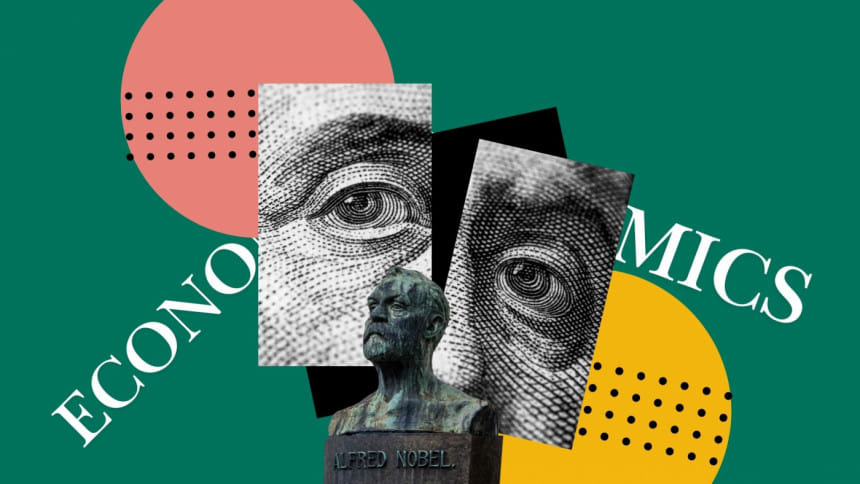Does the 2024 Nobel-winning economic research tell the whole story?

The Nobel Prize in Economics for 2024 was awarded to three American economists whose research explained why some countries are rich and others poor. They used theory as well as empirical evidence to argue that differences in economic institutions are the fundamental cause of divergence in long-run economic growth. Simply put: economic growth is a consequence of good governance, property rights enforcement, constraints on power-holders, and relatively lower rent-seeking by power-holders. However, there are some reservations about their findings.
The honourees are Daron Acemoglu, Elizabeth and James Killian professor of Economics in the Department of Economics at the Massachusetts Institute of Technology(MIT); James A Robinson, a political scientist and an economist, who teaches at the University of Chicago; and Simon Johnson, the Ronald A Kurtz (1954) professor of Entrepreneurship at the MIT Sloan School of Management.
Acemoglu, Johnson, and Robinson's work divides institutions into two categories: "inclusive" and "extractive." Inclusive institutions include property rights, democracy, rule of law and order, and curbs on corruption, while extractive institutions give rise to a high concentration of power and limited political freedom, seek to concentrate resources in the hands of a small elite, and thus stifle economic development.
A book by Acemoglu and Robinson, titled Why Nations Fail: The Origins of Power, Prosperity, and Poverty (2012) analyses why some countries grow while others are left behind. They raise the question: "what forces or institutions promote or hinder economic growth?" They concede that in some cases it appears that GDP growth is determined by a gift of nature but by and large durable and "welfare-promoting" societal institutions are a pre-condition for lasting prosperity. India is an example. It had a per capita income higher than European countries during the Mogul period, but that did not last beyond a few centuries. It is the conducive political and economic institutions that can account for the secular rise in per capita income and welfare of the majority.
A minor point of interest is that all three of the laureates were born outside the US, where they studied and spent most of their lives. Acemoglu was born in Turkey, while the other two were born in the UK (incidentally, Robinson grew up in Barbados). I wonder if their migration to the US might have played a role in their choice of topics: in the divergence of economic growth in different countries. Also, all of them had to journey through one of the top US universities during their career, which has been noted with concern by some academicians.
The three economists examined the European colonisation of large parts of the globe. They wrote a seminal paper in the American Economic Review in 2001 titled "The Colonial Origins of Comparative Development: An Empirical Investigation." As is well known, a critical explanation for the current differences in prosperity is the political and economic systems that the colonisers introduced or chose to foster from the sixteenth century onwards in Asia, Africa, and the Americas.
Several criticisms of the research by the three laureates have been voiced. First of all, they have a very narrow point of view. Their theory legitimises the processes of imperialism and colonialism and, at worst, absolves racism. Where the Europeans settled, they built good institutions but in Africa and Asia they hindered the growth of autonomy and democracy.
Second, researchers at Harvard and Yale point out that it is not institutions that lead to growth. Rather, growth supports the institutions. Taiwan, South Korea, and Singapore had authoritarian governments when they reached peak economic growth. China grew without democratic institutions. Thirdly, their work indicates a bias towards capitalist institutions, inevitably leading to the concentration of wealth and political power among a select minority.
Other economists too challenged the causality. Do political institutions cause economic growth, or do economic growth and human capital development lead to institutional improvement? As indicated above, the causality might have been the opposite of what the trio contends.
Mushtaq Khan, a professor of economics at the School of Oriental and African Studies at the University of London, argues that Acemoglu, Johnson and Robinson's research mainly shows that today's high-income countries score higher on western-based institution indexes, and not that these countries achieved economic development because they established inclusive institutions first.
Also, we lack reliable estimates of "the effect of institutions on economic performance." However, this year's Nobel in economics will boost research into the role of government, wealth inequality, and inquiry into the persistence of poverty.
Regarding the research's relevance for Bangladesh, while the country has experienced significant economic growth, its institutional framework is not considered entirely conducive to sustained long-term growth. Bureaucratic hurdles, corruption, lack of transparency, and weaknesses in regulatory bodies often hinder business operations and investment potential. The recent July-August uprising demonstrated that governance and institutional quality improvements are crucial for Bangladesh to reach its full economic potential. In the last few years, some had hailed Bangladesh as a "Tiger Economy" but it is now clear that all these slogans amounted to hailing the "emperor with no clothes."
Dr Abdullah Shibli is an economist and works for Change Healthcare, Inc., an information technology company. He also serves as senior research fellow at the US-based International Sustainable Development Institute (ISDI).
Views expressed in this article are the author's own.
Follow The Daily Star Opinion on Facebook for the latest opinions, commentaries and analyses by experts and professionals. To contribute your article or letter to The Daily Star Opinion, see our guidelines for submission.

 For all latest news, follow The Daily Star's Google News channel.
For all latest news, follow The Daily Star's Google News channel. 










Comments